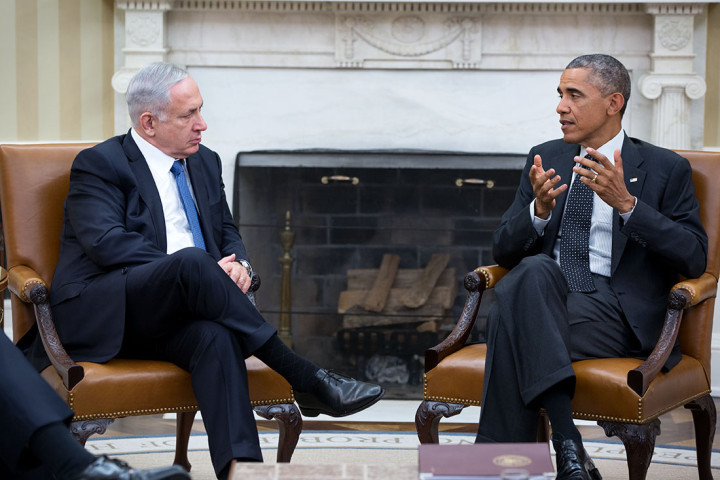In an unprecedented bid, U.S. President Barack Obama plans to succeed Ban Ki-moon as the United Nations Secretary-General and Israel’s Prime Minister Benjamin Netanyahu, who has got wind of the plan, is determined to lead the effort in thwarting the bid, reports the Kuwaiti newspaper Al-Jarida, cited by The Jerusalem Post.
While Ban’s second term as the UN Secretary-General ends on December 31, Obama’s finishes in January 2017. The U.S. Presidential election is due on November 8, 2016.
Al-Jarida quoted sources as saying that Obama has already discussed the issue of running for secretary-general with Democrats, Republicans, and Jewish officials in the U.S. The sources said: “Once Netanyahu got wind of Obama’s plans, Netanyahu began to make efforts to submarine what he has referred to as ‘the Obama project’.”
A source close to Netanyahu did not deny to Al-Jarida that the premier is aiming to “torpedo the Obama project”, noting that “his presidency was characterized by (Washington’s) moving closer to the Muslim Brotherhood, toppling the regime of Hosni Mubarak, and attempts to ally itself with political Islam”.
“Wasn’t eight years of having Obama in office enough?” Netanyahu is quoted in the Kuwaiti daily as telling associates. “Eight years during which he ignored Israel? And now he wants to be in a position that is liable to cause us hardships in the international arena.”
The newspaper cited the widely acknowledged fact that personal ties between Netanyahu and Obama are frayed.
“Obama is the worst president Israel has had to deal with and the worst president for the Middle East and its allies, the moderate Arab states,” a Netanyahu aide is quoted as saying.
“Obama’s term is ending with him forging an alliance with Iran, coming to an agreement with it on its nuclear program which in the end will result in a similar scenario that took place with North Korea,” the aide said.
“Israel will not allow this to happen,” the source is quoted as saying. “It will take all of the necessary steps to prevent Iran from manufacturing a nuclear weapon either covertly or overtly.”
The prime minister’s associate told Al-Jarida that Netanyahu “sees an opportunity to establish good relations based on shared interests with moderate states from which Obama has moved away.” The newspaper added that Netanyahu will “make common cause with moderate Arab governments”.
The Jerusalem Post said: Prime Minister Netanyahu remembers well just how U.S. President Obama brushed aside Israeli objections and went ahead with the P5+1 nuclear agreement with Iran.
Breaking Israel News reported: Al-Jarida was credited with starting a wildfire of rumours in the international press when it printed a story in March 2015, quoting an Israeli source, that Obama halted an airstrike by Israel against targets in Iran by threatening to shoot down the Israeli bombers. The story was picked up by media around the world, but was quelled when the White House denied there was any basis to the story.
If the newspaper report were to be believed, observers said it would be the first time in the 70-year history of the United Nations that one of the five permanent members (P5) of the UN Security Council would field a candidate for the post of the Secretary-General. Hitherto the P5 have “only” dominated selection of the UN head, using their veto power to determine a lowest common denominator compromise candidate.
There are few rules governing the selection of the Secretary-General. The only guiding language is Article 97 of the United Nations Charter, which states: “The Secretary-General shall be appointed by the General Assembly upon the recommendation of the Security Council.”
In 1946, the General Assembly adopted a resolution stating that it was “desirable for the Security Council to proffer one candidate only for the consideration of the General Assembly, and for debate on the nomination in the General Assembly to be avoided.” As a result, the selection is subject to the veto of any of the five permanent members of the Security Council.
The Charter’s minimal language has since been supplemented by other procedural rules and accepted practices. But traditionally, candidates from the P5 (China, France, Russia, the United Kingdom, and the United States) are not considered for the position of Secretary-General to avoid further concentration of power within the UN. “As with regional rotation, this is a matter of precedent and convention, rather than a written rule,” said a UN Insider.
[Article by Ramesh Jaura for IDN-InDepthNews – 9 January 2016]
Related article <> UN Embarks on a New Process to Choose Ban’s Successor










